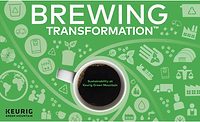Green Mountain Coffee Roasters Inc. (GMCR), Waterbury, Vt., the U.S. Agency for International Development (USAID) and Fair Trade USA announced a partnership to promote biodiversity, conservation and environmental education among Brazil’s coffee-growing communities.
The Sustainable Sourcing Partnership Project aims to increase producer organizations’ understanding and compliance with Fair Trade environmental standards and Brazilian environmental law. The collaboration is designed to support Fair Trade certification for new producer organizations and increase the amount of land under enhanced environmental protection through the certification, the companies said. Fair Trade certification offers coffee farmers fair prices, community investment funds and business skills, they said.
“We fully endorse the goals of the Sustainable Sourcing Partnership in Brazil, which align with Green Mountain Coffee’s commitment to grow purchases of Fair Trade certified coffee,” said Lindsey Bolger, senior director of coffee sourcing and relationships for the specialty coffee business unit of GMCR, in a statement. “We are pleased to participate in this comprehensive program that is focused on helping coffee farming families improve their livelihoods and the biodiversity of their farms. We are confident that this partnership will be a win for consumers and a win for Fair Trade coffee farming families in Brazil.”
The new initiative also will support producer organizations interested in organic production and promote marketplace access for their products, the companies said. GMCR and USAID both contributed $200,000 to fund the initiative. Fair Trade USA will spearhead the program and provide technical and staff expertise, the companies said.
The two-year Sustainable Sourcing Partnership Project is designed to maximize the sustainability of Brazilian small holder coffee cooperatives by delivering technical assistance in three key areas: increasing the Brazilian hectareage under cultivation according to Fair Trade’s environmental standards through new producer outreach, training and certification; strengthening the ability of Brazilian small holders to produce organic certified coffee for export to the U.S. marketplace; and building local capacity for more sustainable agronomy.
Get our new eMagazine delivered to your inbox every month.
Stay in the know on the latest beverage industry marketplace trends.
SUBSCRIBE TODAY!Copyright ©2024. All Rights Reserved BNP Media.
Design, CMS, Hosting & Web Development :: ePublishing


